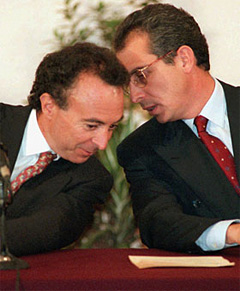
|  |  |  Business News | November 2008 Business News | November 2008  
The US Deficit Turns $1 Trillion
 David Serchuk - Forbes David Serchuk - Forbes
go to original


| Mexico, 1994-1995 - The Cato Institute traces the bailout era to Mexico in the early 1980s. But the era of big bailouts, the one that cost between $50 billion and $65 billion really started in 1995 when a debt crisis threatened Mexico's financial institutions (sound familiar?) and a sudden drop in the value of the peso threatened the regional, if not the global economy. The U.S. led this bailout, forcing American taxpayers to guaranty $40 billion worth of bonds with the proceeds going to the Mexican government so it could pay off its short-term debts.

In Pictures: History's Most Dramatic Bailouts | | |
With the deficit forecast at over $1 trillion for 2009, the Forbes.com Investor Team wonders how we're going to pay for bailouts.

Now it appears that a projected $1 trillion deficit may have been a conservative estimate.

In the middle of November the bi-partisan nonprofit Committee For a Responsible Budget (CRFB) estimated that the accumulated costs of all the various rescue plans could well tip the 2009 U.S. federal deficit over the $1 trillion line for the first time.

The prior record, set in 2008, has been $455 billion. The Congressional Budget Office has estimated the deficit at $750 billion for 2009.

But the CRFB - which counts Paul Volcker and Lawrence Summers among its directors - added in a bunch of costs it deems likely that the CBO missed. It added in $62 billion for the cost of the recession itself, $200 billion for new stimulus legislation and $150 billion for federal bailouts. It also projected $160 billion toward enacted legislation.

"Total borrowing will be much greater than the estimated one trillion dollars," the CRFB wrote, "in light of various bailouts which require new capital but are not budgeted for on a cash basis."

As banking bailouts mount, the automakers beg and sovereign failures like Iceland linger, it's hard to see how the U.S. can continue to borrow enough money to continue to save the world from its own mortgage market.
History's Most Dramatic Bailouts
Forbes
go to original

Though it seems like we're living through an unprecedented era of financial bailouts, these public interventions into private markets are really nothing new. The libertarian Cato Institute traces the "era of officially led bailouts" to Mexico's announcement that it would default on its foreign-held debt in 1982. A decade later, Mexico was in crisis again and the International Monetary Fund had to step in with a $50 billion rescue package.

That, says Cato, "created moral hazard on a global scale. In the following years, the Fund responded to the increased frequency and severity of financial crises by providing bailouts to Thailand, South Korea, Indonesia, Russia, Brazil, Turkey and Argentina, with varied results."

Bailout critics tend to make the same point whether it's a country or a corporation that's getting help: it's usually just a transfer of taxpayer money to wealthy and powerful people--called "the socialization of risk." It means that citizens bear the losses of large, regulated financial institutions while the finance companies and their highly paid executives, keep all of the profits for themselves.

In the case of Citigroup, the government has tried to answer the "socialization of risk" argument by taking preferred equity in the bank, at an 8% dividend. But Citi's executive team and board members all get to keep their jobs and Citigroup CEO Vikram Pandit also gets his part of the $600 million made by selling his hedge fund to Citi when he took over.

It took five years for Mexican president Ernesto Zedillo to confirm the long-held suspicions of many who opposed the Mexico rescue - that the country's then-ruling Institutional Revolutionary Party (PRI) skimmed millions of dollars for itself. Russia, bailed out a few years later earned a reputation for thuggish crony capitalism in the years that followed.

Bailout proponents rarely counter arguments about corruption or fairness. The argument is always the same: to fail to act risks consequences worse than money falling into the wrong hands or coming out of the wrong wallets. The Great Depression is the spectre that haunts these decisions. Indeed, non-crisis programs like Social Security in the U.S. are often mentioned as bailout candidates, while little is done.

In Pictures: History's Most Dramatic Bailouts |

 |
|  |



